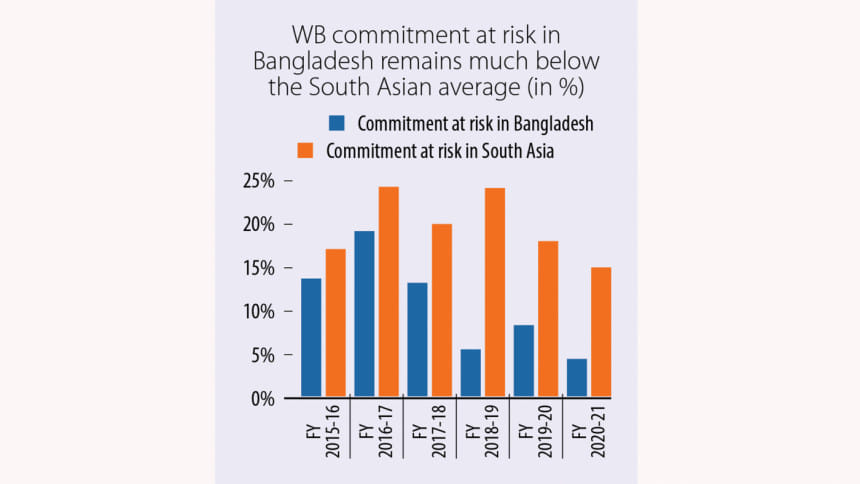WB concerned about project delays

The more than seven years average project implementation period for Bangladesh between 2016 and 2021 presents a risk to the effective implementation of the next country partnership framework, said the World Bank in a report recently.
The internal government processes for project preparation and approval are "very complex and slow", said the World Bank Group's Country Partnership Framework for fiscal 2022-23 to fiscal 2026-27. The CPF was approved by the WB board on April 27.
Project implementation is currently hampered by "incipient institutional arrangements, limited financial allocation for project readiness and implementation by the government, low execution for funds that are allocated and misalignment of policies and regulations".
Between fiscals 2015-16 and 2020-21, a total of 266 projects were implemented with WB financing, and on an average, it took more than two years to get a project approved by the government.
Project preparation in close collaboration between WB teams, the ministries and implementing agencies averages about one year between Concept Review and board approval of lending operations.
Delays during project preparation up to WB approval are often extended by another year (or more) by a complicated process of government internal consultations and clearances that lead to project approval by the Executive Committee of the National Economic Council (ECNEC), the report said.
Only after Ecnec approval is granted can financing agreements be signed and the project ultimately be declared effective; this, in turn, paves the way for the disbursement of project proceeds to finance activities.
The key player in the process for the government is the Bangladesh Planning Commission, which oversees public investments, appraises all investment projects, and convenes Project Evaluation Committee (PEC) meetings to advise on and clear projects before they are submitted for ECNEC approval.
To make the PEC decision-making process more efficient, the WB called for establishing timelines for PEC clearance after project submission.
Better communication is needed between PEC and the ministries involved in the project, specifically when the PEC prepares guidance on activities to be changed and their costs reduced.
In addition to preparation delays, there have been consistent delays during project implementation (following effectiveness), such as in the timely release of funds (from the government budget) for approved projects as well as in the government procurement and auditing processes.
After the WB approves the project financing, it takes another 11 months for first disbursement. It takes three years to get to the 25 percent disbursement, the report said.
To accelerate project implementation, the WB together with other development partners are currently working with the government to establish a Project Preparation Facility as a platform to support the preparation for implementation of critical investment projects.
For the investments to produce results, the study found institutional and implementation arrangements, readiness and capacity were the most important bottlenecks for successful and timely project implementation.
This requires the WB's continued role in supporting institutional strengthening and capacity building, while remaining flexible in adapting operations to the country's needs.
Regardless, the 2016-21 CPF was overall successful, the report said.
For instance, the share of projects with excessive cost overruns has decreased significantly from fiscal 2018-19 and remained below 10.
The proactivity in terms of restructuring and turning around problem projects with unsatisfactory performance was at 100 percent in 3 out of 6 years.
A total of 24 projects were restructured in fiscals 2019-20 and 2020-21 to adapt to the changes under the pandemic.
In addition, the number of projects with unsatisfactory implementation progress or unsatisfactory progress towards achieving their development objectives remained close to the average of 5 per year.
The percentage of commitment at risk declined over the years, remaining substantially below the South Asian average in each fiscal year.
In addition to project restructuring, efforts undertaken by teams to counter implementation challenges also include the introduction of innovative methods of supervision, such as those facilitated by the Geo-Enabling Initiative for Monitoring and Supervision, to optimise project design and project implementation support, specifically in the pandemic years.

 For all latest news, follow The Daily Star's Google News channel.
For all latest news, follow The Daily Star's Google News channel. 








Comments